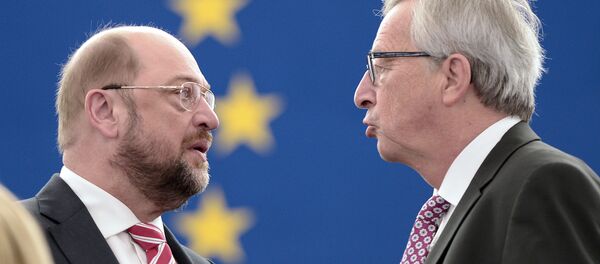The Economic and Financial Affairs Council, July 12, found that Portugal and Spain had not reduced their deficits below 3 percent of GDP, the EU's reference value for government deficits, by the recommended deadline. It also said efforts made by the two countries fell "significantly short" of what was recommended.
The Council's decision triggered sanctions under Article 126(8) of the Treaty on the Functioning of the European Union. The Commission had 20 days to recommend — and the Council ten days — to approve the fines.
However, after pleas from both countries — and despite the default amount established by the legislation being 0.2% of GDP — the Commission — acknowledged their commitments to comply with the Rules of the Stability and Growth Pact recommended to the Council, the cancellation of the fine and setting new fiscal paths for both countries.
Spain shall put an end to the present excessive deficit by 2018, while Portugal shall do so by 2016. For both countries, effective action will be measured on 15 October 2016.
Following @EUCouncil decision, we recommend to cancel fines & to set new fiscal paths for #Spain & #Portugal: https://t.co/OBynUp2sL4
— European Commission (@EU_Commission) 27 July 2016
Divisions
However, there was disunity, with some saying the fines should not be imposed because it would play into the hands of euroskeptics, while other said not imposing the fines would send a signal that member states could break fundamental rules, weakening the whole EU concept.
A senior EU official was quoted by Euractiv.com as saying:
"The issue at stake is enforcing the existing legislation, while those who want simply to break the rules talk about applying them with intelligence. I prefer to live in a system where I trust the police."
EC decision not to propose sanctions for Spain+ Portugal will fuel euroscepticism in countries that follow the rules pic.twitter.com/RMpGfm1asD
— ALDE Group (@ALDEgroup) 28 July 2016
MEP Sylvie Goulard, the Alliance of Liberals and Democrats for Europe Group (ALDE) spokesperson for economic affairs, said: "The Commission decision not to propose sanctions for Spain and Portugal out of fear of increasing euroskepticism in these countries does not take into account the fact that the decision will fuel euroskepticism in countries which follow the rules.
"We would have preferred a decision that had recommended a small but symbolic fine, sending a clear political message to governments that fiscal rules need to be taken seriously. Sound public finances are in the interest of the long term stability of the euro to deliver growth and jobs for our citizens and to avoid putting an excessive debt burden on future generations."



